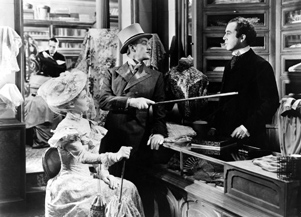Classic Movie Review:
Kind Hearts and Coronets
By Josh Spiegel
June 21, 2010
In many ways, we take comedy for granted. It’s rare that a comedy is ever honored at the Oscars, let alone nominated. Even the recent spate of Judd Apatow movies have gotten no Academy Awards love; the scripts are often given nods from the Writers Guild of America, but nothing from the Academy. One of the most notable recent wins associated with a comedy is from 1988: Kevin Kline won for Best Supporting Actor for his amazing performance in A Fish Called Wanda. Though such awards aren’t an arbiter of a movie being funny or not (Anchorman is easily one of my favorite comedies, but you’d never see Will Ferrell with an Oscar for one of his outsized comic performances), it’s proof that we don’t take comedy seriously (pun firmly intended). But why shouldn’t we consider comedy as something as important as drama?
What’s more, we should take comedy seriously enough to appreciate its roots. Think, if you will, of Eddie Murphy. I know, you’re not thrilled at the prospect, but think about his many roles in the Nutty Professor films or even in the excrescence that was Norbit. Even if it’s so heavily associated with Murphy now, and is something of a major crutch for comic actors including him and his Shrek co-star, Mike Myers, the idea of an actor playing multiple roles goes back very far in film history. Yes, you’re thinking, I’ve seen Dr. Strangelove, too, and I know that Peter Sellers plays multiple roles. While you are correct (and if there are readers out here who haven’t seen Dr. Strangelove…I mean, come on, get to it), I’m going to go a little further back, to 1949, in Great Britain, to a movie called Kind Hearts and Coronets.
Kind Hearts and Coronets is a notable comedy, as it comes from Ealing Studios, which was responsible for some of the great British comedies of the 1950s, including The Lavender Hill Mob and The Ladykillers. Kind Hearts and Coronets came a little early, and is about as dry as a comedy gets, but it also features one actor playing eight roles, as various members of a very well-off family in the Victorian Era. Though Peter Sellers would show up in The Ladykillers, he doesn’t appear in Kind Hearts and Coronets. The actor in question is Alec Guinness. You have paused. Yes, Alec Guinness. You know, Obi-Wan Kenobi. Of course, it’s well-known that Guinness, while making a bundle on his appearances in the Star Wars franchise, loathed the fact that most people from my generation and the previous one only knew him for his role as the wise old Jedi.
Guinness, of course, had a long and varied career, having been a major collaborator with David Lean in films including The Bridge on the River Kwai, Great Expectations, Lawrence of Arabia, A Passage to India, and many more. He also worked in future Ealing comedies, getting an Oscar nomination for Best Actor in The Lavender Hill Mob; he also starred as the nefarious professor in The Ladykillers (for those of you who’ve only seen the American remake, he played the role Tom Hanks played), and spent many years on the stage. The point being: Alec Guinness had a hell of a career before George Lucas came along. And yet, it’s a little shocking to see him at such a young age (he was 35 when Kind Hearts and Coronets was released) playing so many characters, from a slow-moving old reverend to a young and brash royal to a elder feminist. Watching him perform in Kind Hearts and Coronets is breathtaking, because you have to remind yourself you’re watching one actor do so much unthinkable work.
Continued:
1
2

![]() Tweet
Tweet
![]() Print this column
Print this column



